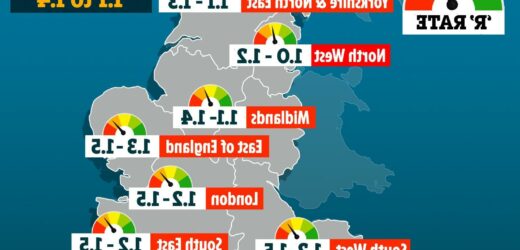THE OFFICIAL R rate in England has dropped for the first time in weeks as Covid cases slow, data has revealed.
Experts have said that there are signs that an increase in infections has slowed, despite there now being one in 65 people with Covid in the country.
This week the R rate sits between 1.1 and 1.4, it's the first time its been as low as 1.1 since July 2.
Last week the R rate was at 1.2 and 1.4 and had been at this rate for two weeks.
Last week cases of the virus fell for seven days in a row but have increased over the last two days.
Data from the Office for National Statistics (ONS) states that one in 65 people in the week to July 24 had Covid – up from one in 75 last week.
The R rate – how many people an infected person spreads the virus to – needs to stay below 1 in order for the outbreak to get smaller.
It comes as:
- Number of Covid patients in hospital falls in fresh sign pandemic is in retreat
- Risk of deadly blood clots increases if you reject vaccine and catch Covid, study warns
- Delta variant poses ‘severe’ risk to mums-to-be as all pregnant women urged to get jabbed
- Holidaymakers told stay outside and keep testing while you’re away, as PHE warns ‘the pandemic is NOT over’
- Record number of Brits ‘pinged’ by NHS app last week as 1 in 5 admit to bending self-isolation rules
But it’s unlikely to do so any time soon as people are seeing more friends and family now restrictions have loosened.
There is a lag of around three weeks in the R rate data – meaning that any impact from Freedom Day won't be seen until next month.
The East of England has the highest R rate in the country, sitting between 1.3 and 1.5.
🔵 Read our coronavirus live blog for the latest updates
London, the South East and the South West are all at 1.2 to 1.5.
The Midlands sits between 1.1 and 1.4, while the North East and Yorkshire sits between 1.1 and 1.3.
The North West, which had previously been dubbed as a hotspot for the Delta variant, currently has the lowest R rate in the country at 1 to 1.2.
The R rate is now published by the UK Health Security Agency.
Up until last week it had been published by Sage, the way the data is produced and modelled will remain the same.
The ONS, that compiles the biggest infection survey in the country said: "In England, the percentage of people testing positive for coronavirus continued to increase in the week ending 24 July 2021, though there are possible signs that the rate of increase may have slowed,"
It was also reported today that the number of people in hospital with Covid started to fall yesterday in yet another sign that the pandemic is in retreat.
Admissions had been growing steadily since mid-May but patients on wards reduced by 126 to 5,056 in England and by one to 6,034 in the UK.
It means the third wave may have peaked a month before experts predicted.
Infections also continued to tumble, with 204,669 in the past seven days — 37 per cent down on the week before.
The figure of 31,117 new daily cases is lower than the 39,906 a week earlier.
A further 85 people in the UK have died
New data from Public Health England also revealed jabs have prevented an estimated 60,000 deaths and more than 22million infections.
Deputy chief medical officer Prof Jonathan Van-Tam hailed it a “truly massive” success.
PHE’s Dr Jamie Lopez Bernal, said that “the true scale of protection from the vaccine programme has become clear”.
Source: Read Full Article





